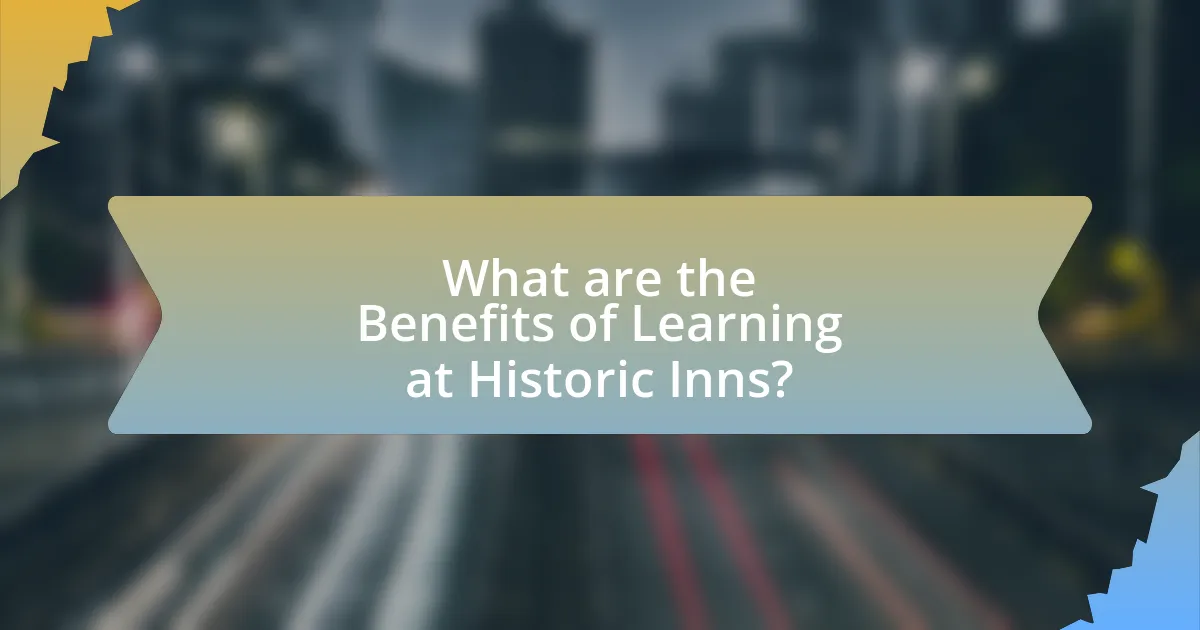Historic inns are accommodations of historical significance that serve as educational centers, offering immersive experiences that connect visitors with local history and culture. These establishments provide guided tours, workshops, and educational programs that enhance understanding of regional heritage through storytelling, traditional crafts, and culinary classes. By integrating local history into their offerings, historic inns foster cultural appreciation and critical thinking skills among travelers, making learning through travel a vital component of holistic education. Additionally, resources for further learning, such as local museums and online archives, complement the educational experiences gained during visits to these historic sites.

What are Historic Inns and Their Role in Education?
Historic inns are accommodations that have historical significance, often reflecting the architectural styles and cultural heritage of their time. Their role in education is to serve as living museums, providing visitors with immersive experiences that enhance understanding of local history, culture, and traditions. For example, many historic inns offer guided tours, workshops, and educational programs that engage guests in the historical context of the region, thereby fostering a deeper appreciation for the past. These educational initiatives often include storytelling, reenactments, and hands-on activities that make history accessible and relatable, effectively transforming travel into a learning opportunity.
How do Historic Inns serve as educational centers?
Historic inns serve as educational centers by providing immersive experiences that connect visitors with local history and culture. These establishments often feature preserved architecture, artifacts, and guided tours that highlight significant historical events or figures associated with the location. For example, many historic inns offer educational programs or workshops that focus on traditional crafts, cooking methods, or local folklore, allowing guests to engage directly with the heritage of the area. Additionally, the historical context of these inns often includes narratives about the communities they served, enhancing visitors’ understanding of regional development and social dynamics.
What types of educational programs are offered at Historic Inns?
Historic Inns offer a variety of educational programs, including historical tours, workshops on traditional crafts, and culinary classes that focus on regional cuisine. These programs are designed to immerse participants in the local history and culture, providing hands-on experiences that enhance learning. For instance, many Historic Inns collaborate with local historians to conduct guided tours that highlight significant events and figures associated with the property, thereby reinforcing the educational value of the experience.
How do Historic Inns integrate local history into their educational offerings?
Historic inns integrate local history into their educational offerings by providing immersive experiences that highlight the cultural and historical significance of their locations. These establishments often feature guided tours that showcase historical architecture, artifacts, and stories related to the region, allowing guests to engage with the past. For example, many historic inns host workshops or lectures led by local historians or artisans, which further enrich the educational experience by offering insights into traditional crafts and local customs. Additionally, some inns collaborate with local museums or historical societies to create programs that emphasize the area’s heritage, ensuring that visitors gain a deeper understanding of the local history during their stay.
Why is learning through travel important?
Learning through travel is important because it provides immersive experiences that enhance understanding and retention of knowledge. Engaging with different cultures, histories, and environments allows individuals to gain firsthand insights that are often more impactful than traditional classroom learning. For instance, visiting historic inns can offer unique perspectives on local history and architecture, fostering a deeper appreciation for cultural heritage. Studies have shown that experiential learning, such as that gained through travel, significantly improves cognitive skills and emotional intelligence, making it a vital component of holistic education.
How does travel enhance experiential learning?
Travel enhances experiential learning by providing immersive, real-world experiences that facilitate deeper understanding and retention of knowledge. Engaging with diverse cultures, historical sites, and local communities allows learners to apply theoretical concepts in practical settings, fostering critical thinking and adaptability. Research indicates that experiential learning, such as that gained through travel, significantly improves cognitive skills and emotional intelligence, as evidenced by studies showing that students who participate in travel-based learning programs demonstrate higher levels of engagement and academic performance compared to traditional classroom settings.
What unique perspectives do Historic Inns provide for travelers?
Historic inns provide travelers with unique perspectives by immersing them in the local history and culture of the area. These establishments often feature architecture and decor that reflect the historical period in which they were built, allowing guests to experience the ambiance of a different era. For instance, many historic inns are located in regions with significant historical events, offering insights into local heritage through guided tours and informational displays. This connection to the past enhances travelers’ understanding of the cultural context surrounding their visit, making their stay not just a lodging experience but an educational journey.

What are the Benefits of Learning at Historic Inns?
Learning at historic inns offers unique benefits such as immersive experiences in history and culture. These inns often serve as living museums, providing guests with firsthand insights into the architectural styles, historical events, and local traditions of their respective eras. For example, staying at an inn that dates back to the 18th century allows visitors to engage with the past through preserved artifacts and guided tours, enhancing their understanding of historical contexts. Additionally, many historic inns host educational programs and workshops that focus on local crafts, culinary traditions, and storytelling, further enriching the learning experience. This combination of direct interaction with history and structured educational opportunities makes historic inns valuable centers for learning through travel.
How do Historic Inns foster cultural appreciation?
Historic inns foster cultural appreciation by serving as living museums that showcase local history, architecture, and traditions. These establishments often preserve historical artifacts and provide narratives about the region’s past, allowing guests to engage with the cultural heritage of the area. For instance, many historic inns are located in buildings that date back several centuries, featuring original furnishings and decor that reflect the lifestyle of previous eras. This immersive experience not only educates visitors about the local culture but also encourages them to appreciate and respect the historical significance of the community.
What role does storytelling play in the educational experience at Historic Inns?
Storytelling serves as a vital component of the educational experience at Historic Inns by engaging visitors with the rich history and cultural narratives of the locations. This immersive approach allows guests to connect emotionally with the past, enhancing their understanding of historical events and figures associated with the inns. For instance, many Historic Inns incorporate local legends and personal anecdotes from past inhabitants, which not only provide context but also make the learning experience more relatable and memorable. Research indicates that storytelling can significantly improve retention of information, as it transforms facts into compelling narratives that resonate with individuals, thereby fostering a deeper appreciation for history and heritage.
How do Historic Inns promote community engagement and involvement?
Historic inns promote community engagement and involvement by serving as venues for local events, cultural activities, and educational programs. These establishments often host workshops, art exhibitions, and historical reenactments that encourage participation from residents and visitors alike. For example, many historic inns collaborate with local artisans and historians to provide authentic experiences that highlight regional heritage, fostering a sense of pride and connection among community members. Additionally, by offering space for community meetings and social gatherings, historic inns strengthen local networks and promote collaboration among various groups, thereby enhancing community cohesion.
What skills can travelers develop through experiences at Historic Inns?
Travelers can develop skills such as cultural awareness, historical knowledge, and interpersonal communication through experiences at Historic Inns. Engaging with the unique architecture and stories of these inns enhances cultural awareness by exposing travelers to local traditions and histories. Additionally, many Historic Inns offer guided tours or educational programs that provide in-depth historical knowledge, allowing travelers to connect with the past. Interpersonal communication skills are also honed as travelers interact with innkeepers and fellow guests, fostering conversations that enrich their travel experience.
How does interaction with local history enhance critical thinking skills?
Interaction with local history enhances critical thinking skills by encouraging individuals to analyze, interpret, and evaluate historical events and their implications. Engaging with local history requires individuals to consider multiple perspectives, assess the reliability of sources, and draw connections between past and present, fostering a deeper understanding of context and causality. For example, studies have shown that students who participate in local history projects demonstrate improved analytical skills and a greater ability to engage in reflective thinking, as they must navigate complex narratives and differing viewpoints inherent in historical accounts. This process not only sharpens critical thinking but also cultivates a sense of civic responsibility and awareness of community heritage.
What opportunities for collaboration and teamwork exist at Historic Inns?
Historic Inns provide numerous opportunities for collaboration and teamwork through their educational programs and community events. These inns often host workshops, guided tours, and historical reenactments that encourage participants to work together, fostering a sense of community and shared learning. For instance, collaborative projects may include restoration efforts or local history research, where guests and staff engage in teamwork to enhance the educational experience. Additionally, partnerships with local schools and organizations facilitate group activities that promote teamwork among participants, reinforcing the inns’ role as educational centers.

How Can Travelers Maximize Their Learning Experience at Historic Inns?
Travelers can maximize their learning experience at historic inns by engaging with the local history and culture through guided tours, interactive exhibits, and conversations with innkeepers. These historic inns often provide rich narratives about their past, including architectural styles and significant events, which can enhance understanding of the region’s heritage. For example, staying at an inn that dates back to the 18th century allows travelers to explore the historical context of that era, often supported by artifacts and documents displayed on-site. Additionally, participating in local workshops or events hosted by the inn can deepen the educational experience, as these activities often reflect traditional practices and local customs.
What tips can enhance the educational experience at Historic Inns?
To enhance the educational experience at Historic Inns, visitors should engage in guided tours that provide historical context and narratives about the inn’s significance. These tours often include detailed accounts of the architecture, notable past guests, and events that shaped the local area, enriching the understanding of the inn’s role in history. Additionally, participating in workshops or lectures hosted by the inn can deepen knowledge about specific historical themes or crafts relevant to the region. For instance, some inns offer cooking classes that reflect historical recipes or preservation techniques, allowing guests to experience history hands-on. Engaging with local historians or curators during visits can also provide unique insights and foster a deeper appreciation for the cultural heritage represented by the inn.
How should travelers prepare for their visit to gain the most knowledge?
Travelers should research the history and significance of the historic inns they plan to visit to gain the most knowledge. Understanding the background, architectural styles, and notable events associated with these inns enhances the educational experience. For instance, many historic inns have ties to significant historical figures or events, such as the Greenbrier in West Virginia, which served as a hospital during the Civil War. Additionally, reviewing available guided tours, educational programs, and local historical resources can provide deeper insights into the cultural context of the area. Engaging with local historians or participating in workshops offered by the inns can further enrich the learning experience.
What questions should travelers ask to deepen their understanding of the history?
Travelers should ask questions such as, “What significant events took place in this location?” and “Who were the key historical figures associated with this inn?” These inquiries help uncover the historical context and importance of the site. For example, understanding that a historic inn served as a meeting place during a pivotal moment in local history can provide deeper insights into the region’s past. Additionally, asking about the architectural style and its historical significance can reveal how the design reflects the cultural influences of the time. Such questions not only enhance the travel experience but also foster a greater appreciation for the historical narratives tied to the location.
What resources are available for further learning after visiting Historic Inns?
After visiting Historic Inns, resources for further learning include historical societies, local museums, and online archives. Historical societies often provide detailed information about the inns’ significance and the surrounding area’s history, while local museums may feature exhibits related to the time periods represented by the inns. Online archives, such as digital collections from universities or historical organizations, offer access to documents, photographs, and research articles that deepen understanding of the historical context. These resources collectively enhance the educational experience gained from visiting Historic Inns.
How can travelers continue their education through local museums and historical societies?
Travelers can continue their education through local museums and historical societies by engaging with curated exhibits, attending lectures, and participating in workshops that focus on regional history and culture. Museums often provide interactive displays and guided tours that offer insights into local heritage, while historical societies frequently host events that delve into specific historical topics, allowing travelers to gain a deeper understanding of the area they are visiting. For instance, the Smithsonian Institution’s museums in Washington, D.C., offer educational programs that attract millions of visitors annually, showcasing the importance of museums in lifelong learning.
What online resources can complement the learning experience from Historic Inns?
Online resources that can complement the learning experience from Historic Inns include virtual tours, educational websites, and historical databases. Virtual tours, such as those offered by Google Arts & Culture, allow users to explore historic inns and their surroundings from anywhere, providing immersive experiences that enhance understanding of their historical significance. Educational websites like the National Trust for Historic Preservation offer articles, resources, and lesson plans focused on the history and architecture of historic inns, making them valuable for both educators and learners. Additionally, historical databases, such as the Library of Congress and local historical societies, provide access to primary sources, photographs, and documents that deepen the knowledge of the inns’ historical context and cultural impact.